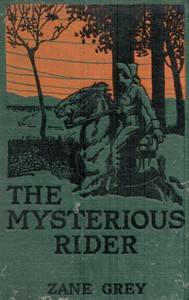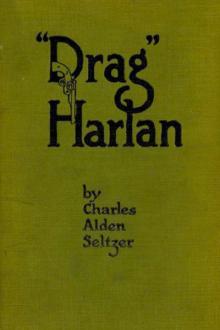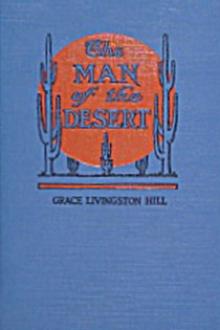The Day of the Beast, Zane Grey [read book txt] 📗

- Author: Zane Grey
Book online «The Day of the Beast, Zane Grey [read book txt] 📗». Author Zane Grey
"I'd like that, Blair."
"You're on. And say, I've another idea. To-night's the Junior Prom—did you know that?"
"No, I didn't."
"Well, it is. Suppose we go up? My sister can get me cards.... I tell you, Dare, I'd like to see what's going on in that bunch. I've heard a lot and seen some things."
"Did you hear how I mussed up Fanchon Smith's party?"
"You bet I did. That's one reason I want to see some of this dancing. Will you go?"
"Yes, I can stand it if you can."
"All right, Buddy, I'll meet you at the inn—eight o'clock."
Lane slowly made his way to a secluded corner of the lobby, where he sat down. Red Payson dead! Lane felt that he should not have been surprised or shocked. But he was both. The strange, cold sensation gradually wore away and with it the slight trembling of his limbs. A mournful procession of thoughts and images returned to his mind and he sat and brooded.
At the hour of his appointment with his friend, Lane went to the front of the lobby. Blair was on time. He hobbled in, erect and martial of bearing despite the crutch, and his dark citizen's suit emphasized the whiteness of his face. Being home had softened Blair a little. Yet the pride and tragic bitterness were there. But when Blair espied Lane a warmth burned out of the havoc in his face. Lane's conscience gave him a twinge. It dawned upon him that neither his spells of illness, nor his distress over his sister Lorna, nor his obsession to see and understand what the young people were doing could hold him wholly excusable for having neglected his comrade.
Their hand-clasp was close, almost fierce, and neither spoke at once. But they looked intently into each other's faces. Emotion stormed Lane's heart. He realized that Blair loved him and that he loved Blair—and that between them was a measureless bond, a something only separation could make tangible. But little of what they felt came out in their greetings.
"Dare, why the devil don't you can that uniform," demanded Blair, cheerfully. "People might recognize you've been 'over there.'"
"Well, Blair, I expected you'd have a cork leg by this time," said Lane.
"Nothing doing," returned the other. "I want to be perpetually reminded that I was in the war. This 'forget the war' propaganda we see and hear all over acts kind of queer on a soldier.... Let's find a bench away from these people."
After they were comfortably seated Blair went on: "Do you know, Dare, I don't miss my leg so much when I'm crutching around. But when I try to sit down or get up! By heck, sometimes I forget it's gone. And sometimes I want to scratch my lost foot. Isn't that hell?"
"I'll say so, Buddy," returned Lane, with a laugh.
"Read this," said Blair, taking a paper from his pocket, and indicating a column.
Whereupon Lane read a brief Associated Press dispatch from Washington, D.C., stating that one Payson, disabled soldier of twenty-five, suffering with tuberculosis caused by gassed lungs, had come to Washington to make in person a protest and appeal that had been unanswered in letters. He wanted money from the government to enable him to travel west to a dry climate, where doctors assured him he might get well. He made his statement to several clerks and officials, and waited all day in the vestibule of the department. Suddenly he was seized with a hemorrhage, and, falling on the floor, died before aid could be summoned.
Without a word Lane handed the paper back to his friend.
"Red was a queer duck," said Blair, rather hoarsely. "You remember when I 'phoned you last over two weeks ago?... Well, just after that Red got bad on my hands. He wouldn't accept charity, he said. And he wanted to beat it. He got wise to my mother. He wouldn't give up trying to get money from the government—back money owed him, he swore—and the idea of being turned down at home seemed to obsess him. I talked and cussed myself weak. No good! Red beat it soon after that—beat it from Middleville on a freight train. And I never heard a word from him.... Not a word...."
"Blair, can't you see it Red's way?" queried Lane, sadly.
"Yes, I can," responded Blair, "but hell! he might have gotten well. Doc Bronson said Red had a chance. I could have borrowed enough money to get him out west. Red wouldn't take it."
"And he ran off—exposed himself to cold and starvation—over-exertion and anger," added Lane.
"Exactly. Brought on that hemorrhage and croaked. All for nothing!"
"No, Blair. All for a principle," observed Lane. "Red was fired out of the hospital without a dollar. There was something terribly wrong."
"Wrong?... God Almighty!" burst out Blair, with hard passion. "Let me read you something in this same paper." With shaking hands he unfolded it, searched until he found what he wanted, and began to read:
"'If the actual needs of disabled veterans require the expenditure of much money, then unquestionably a majority of the taxpayers of the country will favor spending it. Despite the insistent demand for economy in Washington that is arising from every part of the country, no member of House or Senate will have occasion to fear that he is running counter to popular opinion when eventually he votes to take generous care of disabled soldiers.'"
Blair's trembling voice ceased, and then twisting the newspaper into a rope, he turned to Lane. "Dare, can you understand that?... Red Payson was a bull-headed boy, not over bright. But you and I have some intelligence, I hope. We can allow for the immense confusion at Washington—the senselessness of red tape—the callosity of politicians. But when we remember the eloquent calls to us boys—the wonderfully worded appeals to our patriotism, love of country and home—the painted posters bearing the picture of a beautiful American girl—or a young mother with a baby—remembering these deep, passionate calls to the best in us, can you understand that sort of talk now?"
"Blair, I think I can," replied Lane. "Then—before and after the draft—the whole country was at a white heat of all that the approach of war rouses. Fear, self-preservation, love of country, hate of the Huns, inspired patriotism, and in most everybody the will to fight and to sacrifice.... The war was a long, hideous, soul-racking, nerve-destroying time. When it ended, and the wild period of joy and relief had its run, then all that pertained to the war sickened and wearied and disgusted the majority of people. It's 'forget the war.' You and Payson and





Comments (0)